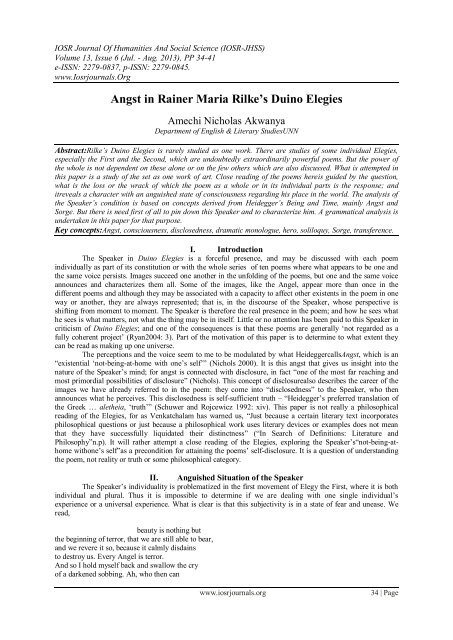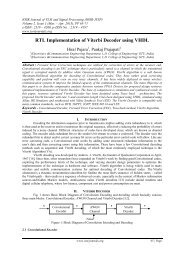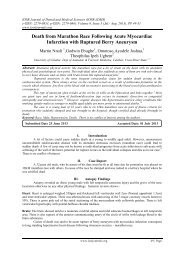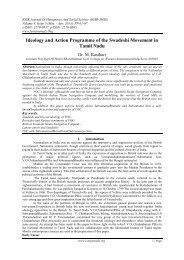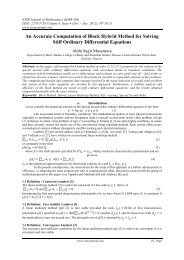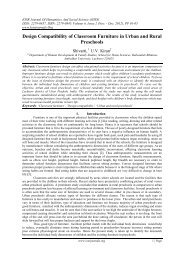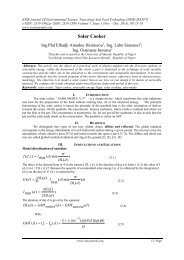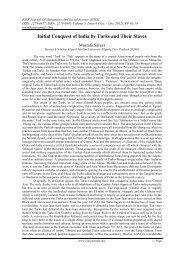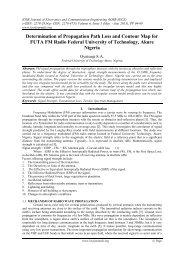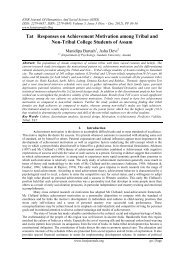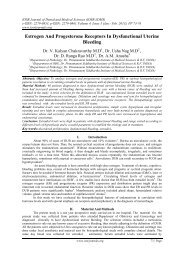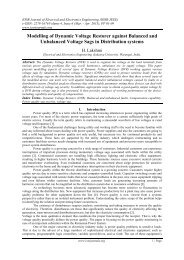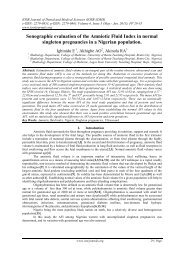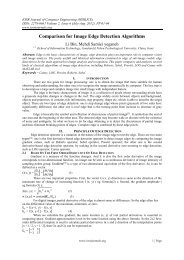Angst in Rainer Maria Rilke's Duino Elegies - IOSR
Angst in Rainer Maria Rilke's Duino Elegies - IOSR
Angst in Rainer Maria Rilke's Duino Elegies - IOSR
Create successful ePaper yourself
Turn your PDF publications into a flip-book with our unique Google optimized e-Paper software.
<strong>IOSR</strong> Journal Of Humanities And Social Science (<strong>IOSR</strong>-JHSS)<br />
Volume 13, Issue 6 (Jul. - Aug. 2013), PP 34-41<br />
e-ISSN: 2279-0837, p-ISSN: 2279-0845.<br />
www.Iosrjournals.Org<br />
<strong>Angst</strong> <strong>in</strong> Ra<strong>in</strong>er <strong>Maria</strong> Rilke’s Du<strong>in</strong>o <strong>Elegies</strong><br />
Amechi Nicholas Akwanya<br />
Department of English & Literary StudiesUNN<br />
Abstract:Rilke’s Du<strong>in</strong>o <strong>Elegies</strong> is rarely studied as one work. There are studies of some <strong>in</strong>dividual <strong>Elegies</strong>,<br />
especially the First and the Second, which are undoubtedly extraord<strong>in</strong>arily powerful poems. But the power of<br />
the whole is not dependent on these alone or on the few others which are also discussed. What is attempted <strong>in</strong><br />
this paper is a study of the set as one work of art. Close read<strong>in</strong>g of the poems hereis guided by the question,<br />
what is the loss or the wrack of which the poem as a whole or <strong>in</strong> its <strong>in</strong>dividual parts is the response; and<br />
itreveals a character with an anguished state of consciousness regard<strong>in</strong>g his place <strong>in</strong> the world. The analysis of<br />
the Speaker’s condition is based on concepts derived from Heidegger’s Be<strong>in</strong>g and Time, ma<strong>in</strong>ly <strong>Angst</strong> and<br />
Sorge. But there is need first of all to p<strong>in</strong> down this Speaker and to characterize him. A grammatical analysis is<br />
undertaken <strong>in</strong> this paper for that purpose.<br />
Key concepts:<strong>Angst</strong>, consciousness, disclosedness, dramatic monologue, hero, soliloquy, Sorge, transference.<br />
I. Introduction<br />
The Speaker <strong>in</strong> Du<strong>in</strong>o <strong>Elegies</strong> is a forceful presence, and may be discussed with each poem<br />
<strong>in</strong>dividually as part of its constitution or with the whole series of ten poems where what appears to be one and<br />
the same voice persists. Images succeed one another <strong>in</strong> the unfold<strong>in</strong>g of the poems, but one and the same voice<br />
announces and characterizes them all. Some of the images, like the Angel, appear more than once <strong>in</strong> the<br />
different poems and although they may be associated with a capacity to affect other existents <strong>in</strong> the poem <strong>in</strong> one<br />
way or another, they are always represented; that is, <strong>in</strong> the discourse of the Speaker, whose perspective is<br />
shift<strong>in</strong>g from moment to moment. The Speaker is therefore the real presence <strong>in</strong> the poem; and how he sees what<br />
he sees is what matters, not what the th<strong>in</strong>g may be <strong>in</strong> itself. Little or no attention has been paid to this Speaker <strong>in</strong><br />
criticism of Du<strong>in</strong>o <strong>Elegies</strong>; and one of the consequences is that these poems are generally ‗not regarded as a<br />
fully coherent project‘ (Ryan2004: 3). Part of the motivation of this paper is to determ<strong>in</strong>e to what extent they<br />
can be read as mak<strong>in</strong>g up one universe.<br />
The perceptions and the voice seem to me to be modulated by what Heideggercalls<strong>Angst</strong>, which is an<br />
―existential ‗not-be<strong>in</strong>g-at-home with one‘s self‘‖ (Nichols 2000). It is this angst that gives us <strong>in</strong>sight <strong>in</strong>to the<br />
nature of the Speaker‘s m<strong>in</strong>d; for angst is connected with disclosure, <strong>in</strong> fact ―one of the most far reach<strong>in</strong>g and<br />
most primordial possibilities of disclosure‖ (Nichols). This concept of disclosurealso describes the career of the<br />
images we have already referred to <strong>in</strong> the poem: they come <strong>in</strong>to ―disclosedness‖ to the Speaker, who then<br />
announces what he perceives. This disclosedness is self-sufficient truth – ―Heidegger‘s preferred translation of<br />
the Greek … aletheia, ‗truth‘‖ (Schuwer and Rojcewicz 1992: xiv). This paper is not really a philosophical<br />
read<strong>in</strong>g of the <strong>Elegies</strong>, for as Venkatchalam has warned us, ―Just because a certa<strong>in</strong> literary text <strong>in</strong>corporates<br />
philosophical questions or just because a philosophical work uses literary devices or examples does not mean<br />
that they have successfully liquidated their dist<strong>in</strong>ctness‖ (―In Search of Def<strong>in</strong>itions: Literature and<br />
Philosophy‖n.p). It will rather attempt a close read<strong>in</strong>g of the <strong>Elegies</strong>, explor<strong>in</strong>g the Speaker‘s―not-be<strong>in</strong>g-athome<br />
withone‘s self‖as a precondition for atta<strong>in</strong><strong>in</strong>g the poems‘ self-disclosure. It is a question of understand<strong>in</strong>g<br />
the poem, not reality or truth or some philosophical category.<br />
II. Anguished Situation of the Speaker<br />
The Speaker‘s <strong>in</strong>dividuality is problematized <strong>in</strong> the first movement of Elegy the First, where it is both<br />
<strong>in</strong>dividual and plural. Thus it is impossible to determ<strong>in</strong>e if we are deal<strong>in</strong>g with one s<strong>in</strong>gle <strong>in</strong>dividual‘s<br />
experience or a universal experience. What is clear is that this subjectivity is <strong>in</strong> a state of fear and unease. We<br />
read,<br />
beauty is noth<strong>in</strong>g but<br />
the beg<strong>in</strong>n<strong>in</strong>g of terror, that we are still able to bear,<br />
and we revere it so, because it calmly disda<strong>in</strong>s<br />
to destroy us. Every Angel is terror.<br />
And so I hold myself back and swallow the cry<br />
of a darkened sobb<strong>in</strong>g. Ah, who then can<br />
www.iosrjournals.org<br />
34 | Page
<strong>Angst</strong> <strong>in</strong> Ra<strong>in</strong>er <strong>Maria</strong> Rilke’s Du<strong>in</strong>o <strong>Elegies</strong><br />
we make use of? Not Angels: not men,<br />
and the resourceful creatures see clearly<br />
that we are not really at home<br />
<strong>in</strong> the <strong>in</strong>terpreted world.<br />
The purpose for which he wants to make use of some oneis not here stated, although there is a sense of a deeply<br />
felt need <strong>in</strong> the Second Elegy for someth<strong>in</strong>g to give mean<strong>in</strong>g to existence. Between two orders of life<br />
surround<strong>in</strong>g the human, the angelicand the resourceful creatures‘, he f<strong>in</strong>ds himself isolated. He does speak <strong>in</strong> the<br />
plural, as if with the voice of the whole of humanity: ―Ah, who then can / we make use of?‖Buthe is recount<strong>in</strong>g<br />
a pa<strong>in</strong>ful emotional state, which is not shared with the rest of humanity: ―And so I hold myself back and<br />
swallow the cry / of a darkened sobb<strong>in</strong>g‖. To this extent he is also far from the rest of humanity: he is strictly an<br />
outsider. Psychologically, he is <strong>in</strong> a state ofangst. He is ―not really at home / <strong>in</strong> the <strong>in</strong>terpreted world‖. First, he<br />
is not at home; second, he is <strong>in</strong> ―the <strong>in</strong>terpreted‖, not the real world; and he is alienated from his own<br />
<strong>in</strong>terpretation. In this ―<strong>in</strong>terpreted world‖, beauty exercises <strong>in</strong>tentionality: ―it calmly disda<strong>in</strong>s / to destroy us‖.<br />
Everyth<strong>in</strong>g seems capable of exceed<strong>in</strong>g its natural limits. The subject, however, must restra<strong>in</strong> himself and hold<br />
back his very emotions.<br />
The shift<strong>in</strong>ess of this Speaker is one reason for the elusiveness that has often been remarked about<br />
these poems (see Krauss 2005). This shift<strong>in</strong>ess is primarily a grammatical question. Now he speaks <strong>in</strong> the first<br />
person s<strong>in</strong>gular; then he speaks <strong>in</strong> the plural; forhe is the ―expansive‖ persona of modernism (MacKay 1987:<br />
150), whose peculiar mode of consciousness is seen <strong>in</strong> The Collected Letters of D.H. Lawrenceas:<br />
another ego, accord<strong>in</strong>g to whose actionthe <strong>in</strong>dividual is unrecognizable, and passes through, as it were,<br />
allotropicstateswhich it needs a deeper sense than any we‘ve been usedto exercise, to discover are<br />
states of the same s<strong>in</strong>gle radically unchanged element(qtd <strong>in</strong> MacKay 207)<br />
Not only is this subjectivity ―throbb<strong>in</strong>g‖, like Tiresias <strong>in</strong> The Waste Land, between s<strong>in</strong>gularity and plurality, it is<br />
also schizoid and addresses itself <strong>in</strong> a one-sided dialogue, as <strong>in</strong> the follow<strong>in</strong>g:<br />
Yes, the Spr<strong>in</strong>g-times needed you deeply. Many a star<br />
must have been there for you so you might feel it. A wave<br />
lifted towards you out of the past, or, as you walked<br />
past an open w<strong>in</strong>dow, a viol<strong>in</strong><br />
gave of itself. All this was their mission.<br />
But could you handle it? Were you not always,<br />
still, distracted by expectation, as if all you experienced,<br />
like a Beloved, came near to you? (First Elegy)<br />
Just as this subjectivity can shift freely from the s<strong>in</strong>gular to the plural first person, so it can shift from first to<br />
second person, and back aga<strong>in</strong>. These three grammatical persons whose dist<strong>in</strong>ctness is so crucial for discourse<br />
freely exchange identities <strong>in</strong> the <strong>Elegies</strong>. It is necessary to track their movements <strong>in</strong> order to see the work <strong>in</strong> its<br />
full disclosedness.Such an exchange takes place between the you and the me/I of the follow<strong>in</strong>g passage:<br />
Or else an <strong>in</strong>scription exaltedly impressed itself on you,<br />
as lately the tablet <strong>in</strong> Santa <strong>Maria</strong> Formosa.<br />
What do they will of me? That I should gently remove<br />
the semblance of <strong>in</strong>justice, that slightly, at times,<br />
h<strong>in</strong>ders their spirits from a pure mov<strong>in</strong>g-on.<br />
The personal pronouns associated with the voice <strong>in</strong> the poems areclearly not configured to the real, nor does<br />
their shift<strong>in</strong>ess thereby―disengage subjectivity from its essence‖ (Lev<strong>in</strong>as 1978: 9). Their function is purely<br />
tactical, and determ<strong>in</strong>ed by the discursive needs of the poem. But as the second person you grammatically<br />
perta<strong>in</strong>s to the other <strong>in</strong> a discursive relation, by its deployment the subject ventures farthest <strong>in</strong>to the field of the<br />
other.<br />
But this is a grammatical effect. The subject still knows itself <strong>in</strong> opposition to other th<strong>in</strong>gs, the Spr<strong>in</strong>gtimes,<br />
the star, the wave, the viol<strong>in</strong>, and the tablet which go out of their way to f<strong>in</strong>d him, so that experience is a<br />
matter of becom<strong>in</strong>g aware of the <strong>in</strong>tentional motions and playful visitations of these events and <strong>in</strong>animate<br />
objects towards oneself. On the other hand, theother does appear on occasions, where one must appeal to the<br />
emergent rhetorical patterns for a dist<strong>in</strong>ction. In the follow<strong>in</strong>g, the Archangel is directly addressed:<br />
www.iosrjournals.org<br />
35 | Page
Let the Archangelnow, the dangerous one, from beh<strong>in</strong>d the stars,<br />
take a s<strong>in</strong>gle step down and toward us: our own heart,<br />
beat<strong>in</strong>g on high would beat us down. What are you?<br />
Early successes, Creation‘s favourite ones,<br />
mounta<strong>in</strong>-cha<strong>in</strong>s, ridges reddened by dawns<br />
of all orig<strong>in</strong> – pollen of flower<strong>in</strong>g godhead,<br />
junctions of light, corridors, stairs, thrones,<br />
spaces of be<strong>in</strong>g, shields of bliss, tempests<br />
of storm-filled, delighted feel<strong>in</strong>g and, suddenly, solitary<br />
mirrors: gather<strong>in</strong>g their own out-streamed beauty<br />
back <strong>in</strong>to their faces aga<strong>in</strong> (Second Elegy).<br />
<strong>Angst</strong> <strong>in</strong> Ra<strong>in</strong>er <strong>Maria</strong> Rilke’s Du<strong>in</strong>o <strong>Elegies</strong><br />
The second person here is the youof dramatic monologue, break<strong>in</strong>g with the more or lesssusta<strong>in</strong>ed soliloquy of<br />
the poetry. Where such a dramatic monologue occurs <strong>in</strong> the Third Elegy, it gives rise to a further transformation<br />
<strong>in</strong> which subjectivity shifts to the third person:<br />
Mother, you made his littleness: you were the one who began him.<br />
In Freud, the phrase is ―his majesty, the ego‖, the hero of dreams. ―His littleness‖ <strong>in</strong> the above verse both plays<br />
upon the delicateness of the young life and substitutes a lowly image, alienated <strong>in</strong> the third person, for the<br />
expected ego ideal. But it is not a totally self-effac<strong>in</strong>g act, s<strong>in</strong>ce he is actually call<strong>in</strong>g upon the mother to turn her<br />
attention once aga<strong>in</strong> to that delicate and tender be<strong>in</strong>g wholly dependent on her love and care for his very<br />
survival, around whom her life once revolved. Care (Sorge) is another Heideggerian concept elucidated <strong>in</strong> Be<strong>in</strong>g<br />
and Time and closely related to <strong>Angst</strong>.Both are positive terms and characterize human life. He writes that,―As a<br />
possibility of be<strong>in</strong>g of Da-se<strong>in</strong>, together with the Da-se<strong>in</strong>itself disclosed <strong>in</strong> it, <strong>Angst</strong> provides the phenomenal<br />
basis for explicitly grasp<strong>in</strong>g the primordial totality of be<strong>in</strong>g of Da-se<strong>in</strong>. Its be<strong>in</strong>g reveals itself as care‖(171).<br />
Da-se<strong>in</strong>, loosely translated as ―human existence‖ (Audi 1999: 371), is kept <strong>in</strong> openness to the world by<br />
<strong>Angst</strong> and projects itself upon its objects through care. In Heidegger‘s own words:<br />
Da-se<strong>in</strong> has a mode of be<strong>in</strong>g <strong>in</strong> which it is brought before itself and itis disclosed to itself <strong>in</strong> its<br />
throwness. But throwness is the mode of be<strong>in</strong>gof a be<strong>in</strong>g which always is itself its possibilities <strong>in</strong> such<br />
a way that itunderstands itself <strong>in</strong> them and from them (projects itself upon them) (Be<strong>in</strong>g and Time 169).<br />
―His littleness‖ is not just this very young and delicate human be<strong>in</strong>g: <strong>in</strong> and through him, the Mother<br />
understands herself. ―His littleness‖ is <strong>in</strong> fact what confers identity on the Mother. The dramatic monologue<br />
br<strong>in</strong>gs this to the Mother‘s attention. The gap between the Speaker and ―his littleness‖ can be closed: they are<br />
one and the same essence. But that between the youof the soliloquy and that of the monologue is based on<br />
essential difference between subjectivity and objectivity.<br />
In these poems, whatever has object status has stability and seems to be capable of transcendence: the<br />
birds can atta<strong>in</strong> ―more <strong>in</strong>timate flight‖; the arrowcan become ―<strong>in</strong> its flight, / someth<strong>in</strong>g more than itself‖; the<br />
hero ―prolongs himself, even his fall<strong>in</strong>g / was only a pretext for be<strong>in</strong>g, his latest rebirth‖; the sa<strong>in</strong>ts can atta<strong>in</strong><br />
such ―listen<strong>in</strong>g‖ that not even the mighty call raised ―from the earth‖ can get their attention; and ―<strong>in</strong> the griev<strong>in</strong>g<br />
for L<strong>in</strong>os, / first music ventured to penetrate arid rigidity‖. By contrast, <strong>in</strong> the soliloquy with the Archangel<br />
stepp<strong>in</strong>g out from beh<strong>in</strong>d the stars, the angels are literally irreducible. Even though beauty may stream out of<br />
them, they lose noth<strong>in</strong>g, but gather ―their own out-streamed beauty / back <strong>in</strong>to their faces aga<strong>in</strong>‖. Objective<br />
status curiously places th<strong>in</strong>gs beyond the ravages of temporality, whereas the subject is at risk and anguished by<br />
this fact.<br />
The poem‘s meditation also has <strong>in</strong> view the mak<strong>in</strong>g sense of this disparity. With regard to angels,they<br />
are ―Early successes, Creation‘sfavourite ones‖ and pure essences beyond the <strong>in</strong>fluence of other creatures. As to<br />
animal creatures who share the world with the human, they exist <strong>in</strong> freedom – not hav<strong>in</strong>g consciousness, and<br />
also, paradoxically, not be<strong>in</strong>g under the rule of death:<br />
We know what is outside us from the animal‘s<br />
face alone: s<strong>in</strong>ce we already turn<br />
the young child round and make it look<br />
backwards at what is settled, not that openness<br />
that is so deep <strong>in</strong> the animal‘s vision. Free from death.<br />
We alone see that: the free creature<br />
has its progress always beh<strong>in</strong>d it,<br />
www.iosrjournals.org<br />
36 | Page
<strong>Angst</strong> <strong>in</strong> Ra<strong>in</strong>er <strong>Maria</strong> Rilke’s Du<strong>in</strong>o <strong>Elegies</strong><br />
and God before it, and when it moves, it moves<br />
<strong>in</strong> eternity, as streams do.<br />
We never have pure space <strong>in</strong> front of us,<br />
not for a s<strong>in</strong>gle day, such as flowers open<br />
endlessly <strong>in</strong>to. Always there is world,<br />
and never the Nowhere without the Not: the pure,<br />
unwatched-over, that one breathes and<br />
endlessly knows, without crav<strong>in</strong>g (Eight Elegy).<br />
The first person plural here is not the sort of tactical move we have discussed. It calls <strong>in</strong>to play, by way of a<br />
signified, human existence itself, which is <strong>in</strong> the proper sense of the word, <strong>in</strong> the world, watched over by death,<br />
and burdened by consciousness and memory.Unlike the ―free creature‖ with ―its progress always beh<strong>in</strong>d it‖, the<br />
human creature by virtue of nurture reflects, look<strong>in</strong>g ―backwards at what is settled‖. With him, therefore, there<br />
is no ―pure space <strong>in</strong> front‖; there can be no ―pure mov<strong>in</strong>g-on‖. What it sees ahead is with a perspective,<br />
presumably through what is past and settled.<br />
The ―openness … so deep <strong>in</strong> the animal‘s vision‖ is fully accounted for <strong>in</strong> Elegy Eight, where we read,<br />
that an animal<br />
mutely, calmly is look<strong>in</strong>g through and through us….<br />
If there was consciousness like ours<br />
<strong>in</strong> the sure creature, that moves towards us<br />
on a different track – it would drag us<br />
round <strong>in</strong> its wake. But its own be<strong>in</strong>g<br />
is boundless, unfathomable, and without a view<br />
of its condition, pure as its outward gaze.<br />
And where we see future it sees everyth<strong>in</strong>g,<br />
and itself <strong>in</strong> everyth<strong>in</strong>g, and is healed for ever.<br />
The animal‘s be<strong>in</strong>g is boundless and unfathomable; consequently, the animal is not properly <strong>in</strong> the world: it is a<br />
―sure creature‖; possibility is not part of its identity as a creature; which means that it is free from angst, as well<br />
as care. For example,it lacks the possibility of becom<strong>in</strong>g careworn, which requires both consciousness and<br />
memory a sense of the future towards which the human is irremediably thrown.<br />
III. Temporality<br />
Be<strong>in</strong>g <strong>in</strong> the world is also to be time-bound; and this is a factor of angst for the Speaker. The Angel<br />
obviously exists outside temporality, s<strong>in</strong>ce his existence is beh<strong>in</strong>d the stars. It is to be expected that stepp<strong>in</strong>g out<br />
from beh<strong>in</strong>d these stars and ventur<strong>in</strong>g <strong>in</strong>to the world would not fail of its effect on that be<strong>in</strong>g. The Speaker cites<br />
the biblical story of Tobias,<br />
when one of the most radiant of you stood at the simple threshold,<br />
disguised somewhat for the journey and already no longer awesome<br />
(Like a youth, to the youth look<strong>in</strong>g out curiously).<br />
If the Angel may have cause to share <strong>in</strong> human experience, humans also long to reach beyond the limits of their<br />
time and space. In Heidegger‘s philosophy, human existence is not limited to actuality; there is also a<br />
potentiality which is essential to it and weighs for him even more than what is actual. By its nature, human<br />
existenceis subject to modification by forces outside itself, but it can also assign itself a goal, give itself an<br />
orientation, and the motivation to achieve it. Such is the possibility of transcendence. He writes,<br />
As a be<strong>in</strong>g, Da-se<strong>in</strong> always def<strong>in</strong>es itself <strong>in</strong> terms of a possibility which it is and somehow understands<br />
<strong>in</strong> its be<strong>in</strong>g. That is the formal mean<strong>in</strong>g of the constitution of the existence of Da-se<strong>in</strong>. But for the<br />
ontological <strong>in</strong>terpretation of this be<strong>in</strong>g, this means that the problematic of its be<strong>in</strong>g is to be developed<br />
out of the existentiality of its existence (41).<br />
As a poetic form, an elegy never fails to <strong>in</strong>scribe the loss that calls it <strong>in</strong>to be<strong>in</strong>g, like the ―Dear lovely bowers of<br />
<strong>in</strong>nocence and ease‖ of Goldsmith‘sThe Deserted Village, or the wrack it endures, like that aris<strong>in</strong>g from the<br />
decease of the ―genial current of the soul‖ and man‘s―useful toil‖ <strong>in</strong> Gray‘sElegyWritten <strong>in</strong> the Country<br />
Churchyard.Rilke‘sDu<strong>in</strong>o <strong>Elegies</strong> does not directly name the state of affairs it laments, lead<strong>in</strong>g readers like<br />
Santner to conclude that these are ―second-order elegies: elegies for the pass<strong>in</strong>g of the space <strong>in</strong> which elegy is<br />
www.iosrjournals.org<br />
37 | Page
<strong>Angst</strong> <strong>in</strong> Ra<strong>in</strong>er <strong>Maria</strong> Rilke’s Du<strong>in</strong>o <strong>Elegies</strong><br />
still possible‖(2006:49). But consider<strong>in</strong>g the subject‘s <strong>in</strong>ability to f<strong>in</strong>d a foot<strong>in</strong>g anywhere,one may formulate<br />
the wrack <strong>in</strong> Du<strong>in</strong>o <strong>Elegies</strong> <strong>in</strong> Heideggerian terms, namely ―the problematic of the world‖ (Be<strong>in</strong>g and Time93):<br />
real contact with this world is elusive to the subject, and at the same time human long<strong>in</strong>g for transcendence is<br />
always already defeated by virtue of be<strong>in</strong>g <strong>in</strong> the world.For human creatures, transcendence would boil down to<br />
attempt<strong>in</strong>g to breakout of the limitations imposed by temporality and escape ―what often / overwhelms us – a<br />
memory‖ (Eight Elegy). It is a hopeless and unrealizable long<strong>in</strong>g:<br />
Then up the stairway, the stairway of call<strong>in</strong>g, up to<br />
the dreamed-of temple of future - : then the trill, founta<strong>in</strong><br />
that <strong>in</strong> its ris<strong>in</strong>g jet already anticipates fall<strong>in</strong>g,<br />
<strong>in</strong> promise‘s play.......And the summer to come.<br />
Not only the devotion of these unfolded forces,<br />
not only the paths, not only the even<strong>in</strong>g fields,<br />
not only, after a late storm, the breath<strong>in</strong>g freshness,<br />
not only approach<strong>in</strong>g sleep and a premonition, even<strong>in</strong>gs...<br />
also the nights!(Seventh Elegy.)<br />
There could be much of promise <strong>in</strong> the unfold<strong>in</strong>g of the forces at work <strong>in</strong> the world, but it all leads ultimately to<br />
night.<br />
In the figure of the ris<strong>in</strong>g jet already anticipat<strong>in</strong>g its fall<strong>in</strong>g, we may <strong>in</strong> fact glimpse the Year-god,a<br />
recurr<strong>in</strong>g pattern <strong>in</strong> tragic art (Murray 1962), whose more frequent manifestations are <strong>in</strong> the annual cycle,<strong>in</strong>the<br />
daily ris<strong>in</strong>g and sett<strong>in</strong>g of the sun, the diurnal cycle, <strong>in</strong> the flourish<strong>in</strong>g and decay of shrubs and flowers, and <strong>in</strong><br />
the birth, growth, achievement, wan<strong>in</strong>g and dissolution of the mythic hero. Only <strong>in</strong> the spectacle of the hero,<br />
who ―prolongs himself, even [<strong>in</strong>] his fall<strong>in</strong>g‖ is this profoundly mythic <strong>in</strong>sight turned on its head.In the Sixth<br />
Elegy, we read that,<br />
In a few the urge to action rises so powerfully,<br />
that they are already wait<strong>in</strong>g and glow<strong>in</strong>g with their heart‘s fullness<br />
when the temptation to flower, like the mild night air,<br />
touches their tender mouths, touches their eyelids:<br />
heroes perhaps, and those chosen to vanish prematurely,<br />
<strong>in</strong> whom Death the gardener wove different ve<strong>in</strong>s.<br />
These plunge ahead: they go before their own smile,<br />
like the team of horses <strong>in</strong> the slightly<br />
hollowed-out relief of Karnak‘s victorious pharaoh.<br />
The hero is strangely close to those who died young. Last<strong>in</strong>g<br />
doesn‘t conta<strong>in</strong> him.<br />
The nearest the human creatures can come towards transcendence seems to be <strong>in</strong> the figure of the hero. These<br />
k<strong>in</strong>ds of heroes exist for and by reason of the action; so free of angst,they―go before their own smile‖. A similar<br />
affirmation is found <strong>in</strong> Yeats‘s―Lapis Lazuli‖, where the characters act their part <strong>in</strong> a tragic play, not heed<strong>in</strong>g the<br />
catastrophe that is impend<strong>in</strong>g,<br />
The great stage curta<strong>in</strong> about to drop,<br />
If worthy their prom<strong>in</strong>ent part <strong>in</strong> the play,<br />
Do not break up their l<strong>in</strong>es to weep.<br />
They know that Hamlet and Lear are gay;<br />
Gaiety transfigur<strong>in</strong>g all that dread.<br />
The Yeatsian hero has consciousness, but this does not burden the character because of the transfigur<strong>in</strong>g power<br />
of gaiety.There is only action <strong>in</strong> that of Rilke: ―Last<strong>in</strong>g / doesn‘t conta<strong>in</strong> him‖; and there is no fear of death <strong>in</strong><br />
him. It does not matter to this hero if he lives only ―once. Never aga<strong>in</strong>‖ (N<strong>in</strong>th Elegy).There is a Dionysian<br />
quality <strong>in</strong> him, the Dionysian hero be<strong>in</strong>g an ideal form, and function<strong>in</strong>g as representative <strong>in</strong>dividual with the<br />
godas a k<strong>in</strong>d of energy beh<strong>in</strong>d the mask. This be<strong>in</strong>g is disclosed <strong>in</strong> Nietzsche‘sThe Birth of Tragedy as follows:<br />
It is a matter of <strong>in</strong>disputable historical record that the only subject-matter of Greek tragedy, <strong>in</strong> its<br />
earliest form, was the suffer<strong>in</strong>gs of Dionysos, and that for a long time the only hero present on the stage<br />
was, accord<strong>in</strong>gly, Dionysos. But one may also say with equal certa<strong>in</strong>ty that, right down to Euripides,<br />
Dionysos never ceased to be the tragic hero, and that all the famous figures of the Greek stage,<br />
www.iosrjournals.org<br />
38 | Page
<strong>Angst</strong> <strong>in</strong> Ra<strong>in</strong>er <strong>Maria</strong> Rilke’s Du<strong>in</strong>o <strong>Elegies</strong><br />
Prometheus, Oedipus etc., are merely masks of that orig<strong>in</strong>al hero, Dionysos. The fact that there is a<br />
deity beh<strong>in</strong>d all these masks is one of the essential reasons for the ―ideal‖ quality of those famous<br />
figures which has prompted so much astonishment(51).<br />
This god that suffers and comes back to life is clearly a powerful presence <strong>in</strong> the First Elegy, where we read,―the<br />
hero prolongs himself, even his fall<strong>in</strong>g / was only a pretext for be<strong>in</strong>g, his latest rebirth‖.<br />
IV. Transference<br />
There rema<strong>in</strong>s <strong>in</strong> these poems the Kristevan figures of ―double dest<strong>in</strong>ations‖ (1982: 43). In the <strong>Elegies</strong>,<br />
love and lovers are such figures with ―double dest<strong>in</strong>ations‖. Love is an aspect of the human condition; at the<br />
same time it seems to signify the possibility of transcendence. Paradoxically, the manifestation of love‘s power<br />
to exceed itself is precisely where it is denied its object. Such is the figure of GataraStampa, ―that / <strong>in</strong>tenser<br />
example of love‖ <strong>in</strong> the First Elegy:<br />
Have you remembered<br />
GastaraStampasufficiently yet, that any girl,<br />
whose lover has gone, might feel from that<br />
<strong>in</strong>tenser example of love: ―Could I only become like her?‖<br />
Should not these ancient suffer<strong>in</strong>gs be f<strong>in</strong>ally<br />
fruitful for us? Isn‘t it time that, lov<strong>in</strong>g,<br />
we freed ourselves from the beloved, and, trembl<strong>in</strong>g, endured<br />
as the arrow endures the bow, so as to be, <strong>in</strong> its flight,<br />
someth<strong>in</strong>g more than itself? For stay<strong>in</strong>g is nowhere.<br />
Here it is the possibility of Da-se<strong>in</strong>, the capacity of love that atta<strong>in</strong>s disclosedness <strong>in</strong> GastaraStampa. In her, love<br />
has become ‗someth<strong>in</strong>g more than itself‖, a form of what the poem knows as ―ancient suffer<strong>in</strong>gs‖.<br />
Rather than see GastaraStampa‘s case as extraord<strong>in</strong>ary, the poem‘s <strong>in</strong>sight is that it can be ―fruitful for<br />
us‖, towards the overcom<strong>in</strong>g of the human condition itself. Hence the Speaker rhapsodizes,<br />
Isn‘t it time that, lov<strong>in</strong>g,<br />
we freed ourselves from the beloved, and, trembl<strong>in</strong>g, endured<br />
as the arrow endures the bow, so as to be, <strong>in</strong> its flight,<br />
someth<strong>in</strong>g more than itself? For stay<strong>in</strong>g is nowhere.<br />
On the other hand, lovers who atta<strong>in</strong> the object of their love and are satisfied <strong>in</strong> them are already a class apart<br />
and are conta<strong>in</strong>ed <strong>in</strong> the utter otherness of the second person, as opposed to the first person plural with which the<br />
Speaker identifies and on behalf of whom he speaks:<br />
Lovers, each satisfied <strong>in</strong> the other, I ask<br />
you about us. You grasp yourselves. Have you a sign?...<br />
you, who under your hands<br />
grow richer like v<strong>in</strong>tage years of the v<strong>in</strong>e:<br />
who sometimes vanish, because the other<br />
has so ga<strong>in</strong>ed the ascendancy: I ask you of us. I know<br />
you touch so blissfully because the caress withholds,<br />
because the place you cover so tenderly<br />
does not disappear: because beneath it you feel<br />
pure duration. So that you promise eternity<br />
almost, from the embrace (Second Elegy).<br />
In their experience of ―pure duration‖ and promise of ―eternity / almost‖, lovers are <strong>in</strong> a world apart, los<strong>in</strong>g<br />
consciousnessof the watchful eye of death. It is as if they now exist outsideof the human condition. But they<br />
have not escaped it: they only havewhat amounts toalmosta promise; and the prospect is almost eternity.<br />
These th<strong>in</strong>gs cannot be atta<strong>in</strong>ed; and there may be false consciousness underly<strong>in</strong>g the posture the<br />
Speaker catches the lovers <strong>in</strong>, s<strong>in</strong>ce the First Elegy discloses about them that ―Ah, they only hide their fate<br />
between themselves‖. In Elegy Five, their striv<strong>in</strong>gs are as hopeless as those of anyone else who is time-bound:<br />
Angel: if there were a place we know noth<strong>in</strong>g of, and there,<br />
on some unsayable carpet, lovers revealed<br />
www.iosrjournals.org<br />
39 | Page
what here they could never master, their high dar<strong>in</strong>g<br />
figures of heart‘s flight,<br />
their towers of desire, their ladders,<br />
long s<strong>in</strong>ce stand<strong>in</strong>g where there was no ground, lean<strong>in</strong>g,<br />
trembl<strong>in</strong>g, on each other – and mastered them,<br />
<strong>in</strong> front of the circle of watchers, the countless, soundless dead:<br />
Would these not fl<strong>in</strong>g their last, ever-saved,<br />
ever-hidden, unknown to us, eternally<br />
valid co<strong>in</strong>s of happ<strong>in</strong>ess <strong>in</strong> front of the f<strong>in</strong>ally<br />
truly smil<strong>in</strong>g pair on the silent<br />
carpet?<br />
<strong>Angst</strong> <strong>in</strong> Ra<strong>in</strong>er <strong>Maria</strong> Rilke’s Du<strong>in</strong>o <strong>Elegies</strong><br />
With ―lovers, each satisfied <strong>in</strong> the other‖, the flow of emotion is caught up <strong>in</strong> a movement from the self to the<br />
other and back aga<strong>in</strong>. Ideally this is a movement that never atta<strong>in</strong>s a po<strong>in</strong>t of rest. The system of potentiality that<br />
is part of the identity of Da-se<strong>in</strong>, to that extent, ceases to apply to lovers. They are each other‘s fulfillment.<br />
Nevertheless, there is a fundamental lack even lovers are subject to, ―their ladders, / long s<strong>in</strong>ce stand<strong>in</strong>g where<br />
there was no ground‖, and someth<strong>in</strong>g that ―here they could never master‖. As a result, there is no question of<br />
their ―f<strong>in</strong>ally / truly smil<strong>in</strong>g‖.<br />
In ―reversal of a negativity <strong>in</strong>to a promise‖ (de Man 50), love is f<strong>in</strong>ally what the Speaker makes use of<br />
<strong>in</strong> understand<strong>in</strong>g his existence. There is a repudiation of human love <strong>in</strong> the Tenth Elegy, where the human object<br />
of human love is distanciated <strong>in</strong> the ―pious capital‖ as Lament. But another k<strong>in</strong>d of love is signified <strong>in</strong> which<br />
Earth is the object. This word moves through the poem, transform<strong>in</strong>g from the name of a place, the earth, to a<br />
k<strong>in</strong>d of div<strong>in</strong>e form, Earth; <strong>in</strong> Lacan‘s phrase,―the capital Other‖ itself:<br />
Earth, is it not this that you want: to rise<br />
<strong>in</strong>visibly <strong>in</strong> us? – Is that not your dream,<br />
to be <strong>in</strong>visible, one day? – Earth! Invisible!<br />
What is your urgent command if not transformation?<br />
Earth, beloved, I will. O, believe me, you need<br />
no more Spr<strong>in</strong>g-times to w<strong>in</strong> me: only one,<br />
ah, one, is already more than my blood can stand.<br />
Namelessly, I have been truly yours, from the first.<br />
You were always right, and your most sacred <strong>in</strong>spiration<br />
is that familiar Death.<br />
See I live. On what? Neither childhood nor future<br />
grows less......Excess of be<strong>in</strong>g<br />
wells up <strong>in</strong> my heart (N<strong>in</strong>th Elegy).<br />
The whole network of the Lacanian transference is played up here. For transference has two terms: ―the positive<br />
transference is when you have a soft spot for the <strong>in</strong>dividual concerned … and the negative transference is when<br />
you have to keep your eye on him‖ (2002:124). This effusion here affords a glimpse <strong>in</strong>to the Speaker‘s<br />
unconscious:<br />
it is to this that the transference gives us access, <strong>in</strong> an enigmatic way. It is a Gordian knot that leads us<br />
to the follow<strong>in</strong>g conclusion—the subject is look<strong>in</strong>g for his certa<strong>in</strong>ty (129).<br />
The Speaker does not make use of facts <strong>in</strong> his search for certa<strong>in</strong>ty; it is by a movement of <strong>in</strong>terpretation.<br />
Thereby he has resolved his problematic of be<strong>in</strong>g <strong>in</strong> the world: it consists of a relation to a ―capital Other‖,<br />
Earth, whose urgent command, which he is more than will<strong>in</strong>g to obey, is to become the mode of expression of<br />
the ―capital Other‖. In death, this subject is certa<strong>in</strong> to atta<strong>in</strong> ―excess of be<strong>in</strong>g‖; he would at last become, like the<br />
arrow, the viol<strong>in</strong>, the sa<strong>in</strong>t, GastaraStampa‘s love, ‗someth<strong>in</strong>g more than itself‖. Instead of someth<strong>in</strong>g<br />
confront<strong>in</strong>g consciousness and tend<strong>in</strong>g to <strong>in</strong>capacitate it, Death, although a ―capital Other‖, is now glorified as<br />
Earth‘s―most sacred <strong>in</strong>spiration‖. For that is how Earth‘s dreamto ―rise / <strong>in</strong>visibly <strong>in</strong> us‖ is realized.<br />
V. Conclusion<br />
The Tenth Elegy calls the new devotion struck <strong>in</strong> the N<strong>in</strong>th a ―fierce <strong>in</strong>sight‖. It gives the Speaker a<br />
new orientation towards the various th<strong>in</strong>gs and relations that have exercised his anxiety and kept him <strong>in</strong> a state<br />
of not be<strong>in</strong>g at home with himself, <strong>in</strong>clud<strong>in</strong>g Angels, Nights of anguish, temporality. It does not rid him of pa<strong>in</strong>,<br />
www.iosrjournals.org<br />
40 | Page
<strong>Angst</strong> <strong>in</strong> Ra<strong>in</strong>er <strong>Maria</strong> Rilke’s Du<strong>in</strong>o <strong>Elegies</strong><br />
but it changes pa<strong>in</strong> from what one endures; what one fears, to the very element of existence: ―place, settlement,<br />
camp, soil, dwell<strong>in</strong>g‖. The terror of the <strong>in</strong>terpreted world is hereby overcome by another <strong>in</strong>terpretation.<br />
References<br />
[1]. R. Audi, The Cambridge dictionary of philosophy2 nd Ed. (Cambridge, UK: UP, 1999).<br />
[2]. P. de Man,.Allegories of read<strong>in</strong>g: figural language <strong>in</strong> Rousseau, Nietzsche, Rilke, and Proust(New Haven,CT: Yale, 1979).<br />
[3]. O. Goldsmith, Thedeserted village<br />
[4]. T.,Gray, Elegy <strong>in</strong> the country churchyard.,http://www.bartleby.com/101/453.html><br />
[5]. M. Heidegger, Be<strong>in</strong>g and time(Albany, NY: State University of New York Press, 1996).<br />
[6]. ____. Parmenides. Trans. André Schuwer and Richard Rojcewicz (Bloom<strong>in</strong>gton, IN: Indiana University Press,1992).<br />
[7]. A.S. Kl<strong>in</strong>e, Ra<strong>in</strong>er <strong>Maria</strong> Rilke: Du<strong>in</strong>o <strong>Elegies</strong>.2001 .Web.<br />
[8]. N. Krauss, Read<strong>in</strong>g Rilke: Reflections on the problems of translation and Du<strong>in</strong>o <strong>Elegies</strong>(Boston, MA: Boston Review. 1993-2005).<br />
[9]. J. Kristeva, Desire <strong>in</strong> language: A semiotic approach to literature and art(Oxford, UK: Blackwell, 1982)<br />
[10]. J. Lacan, The four fundamental concepts of psycho-analysis(New York, NY: W.W. Norton, 1981).<br />
[11]. E. Lev<strong>in</strong>as, Otherwise than be<strong>in</strong>g or beyond essence(Dordrecht, Netherlands: Kluwer Academic Publishers, 1978).<br />
[12]. C.H. MacKay, Soliloquy <strong>in</strong> n<strong>in</strong>eteenth-century fiction(London, UK: Macmillan, 1987).<br />
[13]. G. Murray, Aeschylus: The creator of tragedy(Oxford, UK: Clarendon, 1962).<br />
[14]. C.M. Nichols, Primordial freedom: The authentic truth of Dase<strong>in</strong> <strong>in</strong> Heidegger‘s―Be<strong>in</strong>g and Time‖,Th<strong>in</strong>k<strong>in</strong>g Fundamentals9(2),<br />
2000.<br />
[15]. F. Nietzsche, Friedrich. The birth of tragedy and other writ<strong>in</strong>gs(Cambridge, UK: UP, 1999).<br />
[16]. J. Ryan, Rilke, modernism and poetic tradition(Cambridge, UK: UP,2004).<br />
[17]. E.L. Santner, (On creaturely life (Chicago, IL: Chicago University Press, 2006).<br />
[18]. S. Venkatchalam, In search of def<strong>in</strong>itions: Literature and philosophy, Consciousness, Literature and the Arts 8(1)<br />
2007<br />
[19]. Yeats, William Butler. Lapis Lazuli.<br />
www.iosrjournals.org<br />
41 | Page


